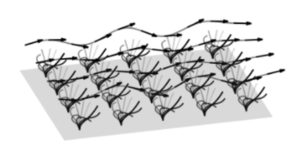Head impacts in sport not leading to concussion could still alter brain blood flow regulation

There is a concern that people playing contact sports leading to head impacts could be at an increased risk of neurodegenerative disease and dementia.
While there are many protocols around concussion in sport, new findings from the Exeter Head Impact, Brain Injury and Trauma research group (ExHIBIT) at the University of Exeter highlights that head impacts not resulting in concussion (i.e. sub-concussive) can still be affecting brain blood flow regulation. This is potentially important and might help explain why head impacts over the course of a sporting career can increase the risk of neurodegenerative disease, even in the absence of concussion.
During the research, published in the European Journal of Applied Physiology, 18 amateur boxers from the university (12 male, six female) completed three trials in a randomised order. The trials consisted of three rounds of boxing, an equivalent bout of pad boxing where no blows to head were sustained, and then sitting for the same amount of time. Brain blood flow regulation was assessed immediately before each trial, and 45 minutes afterwards using complex but minimally invasive techniques, including ultrasound.
Dr Bert Bond from the University of Exeter led the research and said: “We found that after boxing there was an alteration in the ability to regulate brain blood flow – even in healthy boxers – and the magnitude of this change was associated with the number of times the boxer was hit in the head. It’s important to point out none of these boxers received a concussion, they all felt absolutely fine and were asymptomatic.
“This data adds to a growing concern surrounding the exposure to sub-concussive impacts during a sporting career. Heading in football is a good example; very few people sustain a concussion by heading a football, but there are concerns that heading a football repeatedly for many years could be linked to dementia risk. We also know people who box over a career are at increased risk of neurodegenerative diseases, but we don’t really understand why. Previous research has shown that if you’re exposed to head impacts over the course of a sporting career, your ability to regulate brain blood flow may be altered, and this may increase the risk of dementia. The findings from our study indicate that acute disruptions to brain blood flow regulation occur in the aftermath of receiving sub-concussive impacts.
“Further work is now needed to build on this research and understand how long this alteration to brain blood flow lasts, whether this represents a window of acute vulnerability to further head impacts, and if sub-concussive head impacts have long term implications to brain health.”
Dr Bert Bond is a Senior Lecturer in Sport and Health Sciences at the University of Exeter and co-directs the ExHIBIT group with Dr Genevieve Williams. As well as boxing, the group is also conducting research on head impacts in football, rugby union, horse racing, BMX and mountain biking.
The European Journal of Applied Physiology paper is entitled ‘The acute influence of amateur boxing on dynamic cerebral autoregulation and 2 cerebrovascular reactivity to carbon dioxide’.



